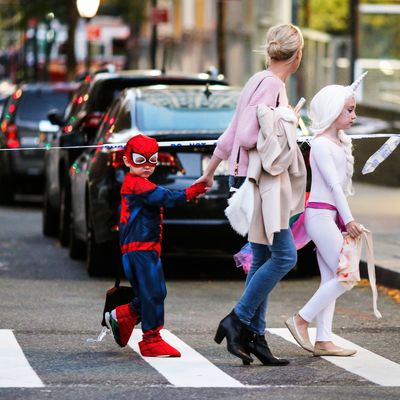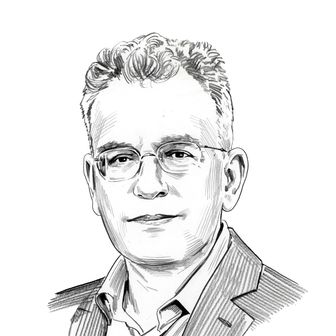
We all knew it was coming, of course. The inevitable next attack has lingered in the back of every New Yorker’s head since 2001, since 1993, even since 1948, when E.B. White, in Here Is New York, wrote movingly about the city’s newfound vulnerability. (Maybe even since the wall went up in New Amsterdam. We named a street after it.) There was, last night and this morning, sorrow and frustration that, once again, the nature of open city life was turned against us. But, unnervingly soon, a lot of reactions seemed to shift invisibly from “Oh God” to “It could have been worse, I guess.” The last terrorist assault on New York left nearly 3,000 dead and a smoking, monstrous pile that took a year to remove and a decade to replace; this scene could be back to normal in a day or two, though the candle-burning and piled-up floral tributes will surely linger for a while.
We not only put our heads down and moved on; we literally paraded last night. It speaks well of New Yorkers that we did not cancel the Village Halloween Parade, an event that (in the past, anyway, when it was more outré and less domesticated) constituted a thumb in the eye of the fundamentalism and fear that inspire attacks like yesterday’s. The New York City Marathon, this weekend, will go on as well. And if you weren’t at the parade or one of the first responders — or, it should go without saying, among the injured and dead and their families — last night, you could go about your usual business. I met up with a few other families in the evening to take our kids trick-or-treating, then went to see a friend who was in from California, and the afternoon’s attack was acknowledged with a few head-shakes and grumbles along the lines of “Yeah, bad day.” The other shoe dropped, and a lot of people were able to ignore it.
There was, after the 9/11 attacks, a sense that the world had been readjusted on its axis, and not for the better. Even the 1993 attack left the city wounded and edgy for a good long time. This act of terrorism, on vaguely the same scale as the first Trade Center attack — although 1993 caused far more injuries owing to smoke, there were six deaths then —seems, barely a day later, almost to have slipped past a lot of people.
The more accurate comparison may be not so much to those previous attacks on New York but to those in other cities: London in the 1970s and 1980s, when IRA bombings were part of daily life, or Jerusalem at various times in the past few decades, as citizens grew fatalistically accustomed to the occasional attack on a bus or restaurant. We have at once reacted crazily (“The city was just attacked by a terrorist, and you’re going to D’Agostino?!”) and sanely (“The hell with those bastards, I’m going down to the D’Agostino”). Given that it takes a certain suspension of discomfort to live here anyway, that is not surprising. It also, less charmingly, means we have all decided to live with, and willfully push out of our minds, the cold fact that this isn’t the last one. As long as we have leaders who will continue to keep making terrible choices on our behalf, this is how we power through.
“All dwellers in cities must live with the stubborn fact of annihilation; in New York the fact is somewhat more concentrated because of the concentration of the city itself, and because, of all targets, New York has a certain clear priority. In the mind of whatever perverted dreamer might loose the lightning, New York must hold a steady, irresistible charm.” —E.B. White, 1948.






























